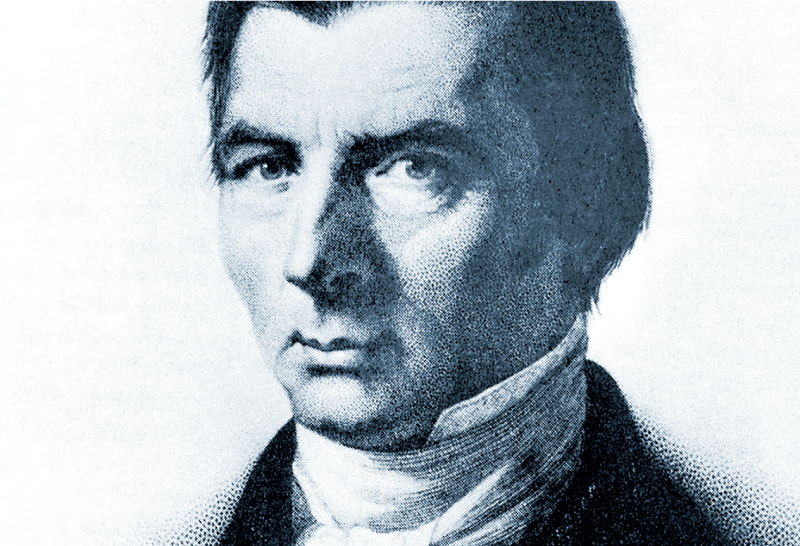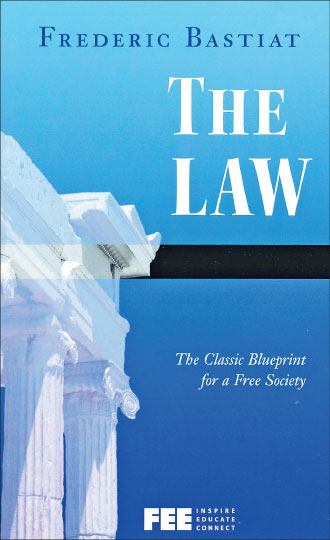Saturday Feb 21, 2026
Saturday Feb 21, 2026
Monday, 5 June 2023 00:53 - - {{hitsCtrl.values.hits}}

Frédéric Bastiat
 It is common that whenever a difficult philosophical idea is presented, Man the Wise usually shuns it in favour of light entertainments. No one can blame them because these novel ideas are presented to them in languages that could not be understood by them or with frightening mathematical expositions. However, the beauty of Bastiat is that his language and examples are simple, and he does not use mathematics to present his case precisely. Still the Sinhala translation of Bastiat’s work did not receive the recognition that it deserves. The cost of that ignorance has continued to tax the Sri Lankan society heavily in the subsequent periods as it had done previously
It is common that whenever a difficult philosophical idea is presented, Man the Wise usually shuns it in favour of light entertainments. No one can blame them because these novel ideas are presented to them in languages that could not be understood by them or with frightening mathematical expositions. However, the beauty of Bastiat is that his language and examples are simple, and he does not use mathematics to present his case precisely. Still the Sinhala translation of Bastiat’s work did not receive the recognition that it deserves. The cost of that ignorance has continued to tax the Sri Lankan society heavily in the subsequent periods as it had done previously
 Rebirth of Sri Lanka Bastiat Society
Rebirth of Sri Lanka Bastiat Society
Last week in a simple ceremony, Sri Lanka Bastiat Society was relaunched. The Bastiat Society Sri Lanka Chapter was set up in 2015 but it had a natural death after a few public events. Now Sri Lanka Night Watchman Society, a meetup group that discusses broad-based classical ideas, has merged with the Sri Lanka Bastiat Chapter (visit: https://www.nightwatchmansociety.org/the-nightwatchman-society-announces-merger-with-bastiat-society-of-sri-lanka/) making it the official Sri Lanka Bastiat Society. Frédéric Bastiat, French economist and statesman of the early 19th century, was noted for expressing his independent views on numerous issues facing society at that time.
Sinhala readers did not show interest in Bastiat
The Sri Lanka Bastiat Society published in 2015 Bastiat’s economic views in Sinhala, translated by Sri Lanka born sociologist Aruni Shapiro, to make them accessible to the Sinhala readers. It did not generate a wide-spread interest among the Sinhala readers. I recall that when a free copy of this book was given to some select undergraduates in a state university so that there could be an open public discussion on its views later, there was no response from the undergraduates concerned. Hence, the project came to a standstill. This frustrating experience is not typical only for Bastiat’s philosophy.
It is common that whenever a difficult philosophical idea is presented, Man the Wise usually shuns it in favour of light entertainments. No one can blame them because these novel ideas are presented to them in languages that could not be understood by them or with frightening mathematical expositions. However, the beauty of Bastiat is that his language and examples are simple, and he does not use mathematics to present his case precisely. Still the Sinhala translation of Bastiat’s work did not receive the recognition that it deserves. As this article explains, the cost of that ignorance has continued to tax the Sri Lankan society heavily in the subsequent periods as it had done previously.
 Numerous pamphlets by Bastiat
Numerous pamphlets by Bastiat
Bastiat was the author of many works on economics but there are three main works which should receive our attention today. One is The Legal Plunder. Another is The Parable of the Broken Window. The last is The Law. All these three works were incorporated into the Sinhala translation mentioned above to provide a comprehensive view of Bastiat to Sinhala readers. Yet, the response received was a lacklustre one. In this article, I will take the readers through some of the main expositions of Bastiat.
Distinguishing a good economist from a bad one
Bastiat has advised us how we should distinguish a good economist from a bad one. This is important because we are bombarded by economic views daily by those who present themselves as economists. The Cambridge Don, Joan Robinson who got frustrated by such economists, remarked that we should learn economics not to make economic policies but to save us from those who pose as economists. Two hundred years ago, Bastiat told us how we can identify such bad economists and keep them away. Said Bastiat: ‘The difference between a bad economist and a good economist is that the bad economist sees only what can be seen and a good economist, in addition to what can be seen, can see what is to be foreseen as well’.
What this means is that a bad economist sees only the near consequences of an economic policy. But a good economist sees the entire gamut of the consequences of that policy for today as well as tomorrow and how it will affect other sectors in the economy too.
It suffices to examine only a few recent examples in which the Sri Lankan policymakers had not shown this calibre.
 Bastiat stood for human liberty encompassing the freedom of thought and expression on one side and right to hold property and protect that property from being plundered by those in power, on the other. Bastiat sarcastically said that laws made by those in power are legal means of plundering. He said that ‘when plunder becomes a way of life for a group of men in a society, over the course of time they create for themselves a legal system that authorises it and a moral code that glorifies it’. The tendency by kings to plunder the private wealth is not a new idea because the Buddha some 2,500 years ago said that one should accumulate wealth step by step in the same way as an ant builds an anthill. But he should protect his wealth from natural disasters, from prodigal children, from thieves, and from kings
Bastiat stood for human liberty encompassing the freedom of thought and expression on one side and right to hold property and protect that property from being plundered by those in power, on the other. Bastiat sarcastically said that laws made by those in power are legal means of plundering. He said that ‘when plunder becomes a way of life for a group of men in a society, over the course of time they create for themselves a legal system that authorises it and a moral code that glorifies it’. The tendency by kings to plunder the private wealth is not a new idea because the Buddha some 2,500 years ago said that one should accumulate wealth step by step in the same way as an ant builds an anthill. But he should protect his wealth from natural disasters, from prodigal children, from thieves, and from kings
Tax cut in 2019 saw only the near-term effects
One is the drastic cut in taxes by the previous Gotabaya Rajapaksa administration in December 2019 expecting the tax revenue to go up when it concentrates on only the large taxpayer units. I warned the administration not to do this in December 2019 and again in 2020 because it will create a serious dent in government revenue making it incapable of handling its economic policy framework properly. However, the administration believed that once the taxes are cut, firms will have higher earnings and they will reinvest those earnings in productive enterprises increasing the country’s tax capacity in the medium to long-run. What was missing in this analysis was the ignorance that investment of higher earnings takes place not because funds are available but because there are other conditions that should be satisfied for people to go for new investments. Hence, what happened was that the government lost its tax revenue to the extent of about Rs. 600 billion per annum but there were not compensatory private sector investments to increase the country’s tax capacity. It is a clear example of only seeing the near consequences of a policy.
Fallacy of substituting corn for dhal
Another is the proposal, to save the outflow of foreign exchange, by a legislator that Sri Lankans should switch over to eat corn instead of imported dhal. On the face of it, it seemed to be a very constructive proposal. I requested the final year undergraduates of a state university to analyse it in terms of its validity across the economy and effects in the long run. These students came out with a fine analysis. Across the economy, they said that corn is not adequately produced in the country, it is being used as a poultry feed, and if it is used as a substitute for dhal, its price will rise raising the cost of producing poultry feeds. People will not have either dhal or chicken and eggs. In the long run, more foreign exchange should be expended by the country causing a bigger gap in the balance of payments. The legislator in question has looked at only the effects to be seen and not the ones to be foreseen. Surely, he is a bad economist.
 A bad economist sees only the near consequences of an economic policy. But a good economist sees the entire gamut of the consequences of that policy for today as well as tomorrow and how it will affect other sectors in the economy too
A bad economist sees only the near consequences of an economic policy. But a good economist sees the entire gamut of the consequences of that policy for today as well as tomorrow and how it will affect other sectors in the economy too
Disastrous attempt at converting agriculture into organic overnight
The third is the decision to convert the country’s agriculture to organic overnight by banning the importation of chemical fertilisers and pesticides. The objective was to save foreign exchange that the country should expend for the importation of these essential inputs for the agriculture. However, the short-term and the long-term effects were devastating. All the crops in Sri Lanka declined, more foreign exchange had to be spent on importing essential foods, there was a loss in foreign exchange due to the drop in export crops, farmers became poorer, the government had to distribute supporting handouts to them, and finally, the country had to restart its agriculture as a new enterprise. It showed that the advocates of this policy had seen only the effects in the current period and not foreseen the long-term effects. They were bad economists.
It is good if a window is broken
Bastiat used a humorous language to make his views easily understood by his readers. His parable of the broken window is one such instance. In this parable, a broken window, though it is a cost at the time, has far reaching consequences on the economy and it will have some beneficial effects. About a hundred years after Bastiat, the Austrian American economist Joseph Schumpeter called such an instance a ‘creative destruction’. Though it is a loss and a disturbance to society, it brings in far more benefits to it. Bastiat has made his argument by analysing it from a holistic point. It is James Goodfellow’s window that has been broken by his son by accident. Bu it enables him to fix a new window of a later generation. Window producers will allocate resources for its production. As a result, the entire economy will at every level of production get together to make the new window for James Goodfellow.
Prince Siddhartha’s holistic worldview
This knowledge has been there among the humans throughout history, and it is not a creation by Bastiat anew. For instance, the Buddhist literature tells a story about King Suddhodana and Prince Siddhartha, that seemed to have taken place 2500 years ago. According to this story, King Suddhodana had asked the Sakya Princes whether they knew how rice came. One prince had said that when he sits on the golden chair at the golden table, rice comes to the golden plate. Another prince had refuted him saying that rice had come to the golden plate from a silver tray that had been carried from the kitchen. They had said many but none of them had not known exactly how rice came. It was only Prince Siddhartha who had explained the entire process in detail.
He had said that farmers in a certain village had gone to the paddy fields early in the morning to cultivate paddy. They had used mamoties that had been manufactured by blacksmiths in a different village. Those blacksmiths had used the steel that had been manufactured by steel millers in another village. So, it was a whole story covering the entire economy. Therefore, one incident in a particular place may have connections to many other incidents in an economy. When this incident is promoting the economy, it will promote all other economic activities in an economic system. In the opposite, any destruction that may have been made will have similar destructive effect across the economy.
Taxes are a legal way of plundering
Bastiat stood for human liberty encompassing the freedom of thought and expression on one side and right to hold property and protect that property from being plundered by those in power, on the other. Bastiat sarcastically said that laws made by those in power are legal means of plundering. He said that ‘when plunder becomes a way of life for a group of men in a society, over the course of time they create for themselves a legal system that authorises it and a moral code that glorifies it’. The tendency by kings to plunder the private wealth is not a new idea because the Buddha some 2,500 years ago said that one should accumulate wealth step by step in the same way as an ant builds an anthill. But he should protect his wealth from natural disasters, from prodigal children, from thieves, and from kings.
About the dependence syndrome harboured by some people, Bastiat said that ‘everyone wants to live at the expense of the state. They forget that the state lives at the expense of everyone’. He also explains how it happens in terms of redistribution efforts made by governments. The government may unjustly pass a law, and they very often do it, to take over the property of someone when he has hard earned it and gives to another who had not done anything to earn it. It simply discourages the person who makes the wealth to engage in further wealth building. It also encourages those who wealth recipients not to engage in any productive work. As a result, we create a society of beggars and beggars are simply free riders. Since they do not make any contribution, the economy will begin to shrink making everyone beggars. Bastiat says this possibility should be avoided.
Fearless free thinker
Bastiat was a free thinker. He fought, sometimes cynically, to protect his and others’ right to think and express views freely. He said that the safest way to make laws respected was to make them respectable. What this means is that in a democratic state, both the executive and the legislature are inclined to introduce laws that will violate the basic human rights which people have acquired by birth. But it is the duty of the judiciary to protect these rights. For that the judiciary should be independent from both these powers. In Sri Lanka’s present context, this should be one of the paramount requirements of building a just society.
 The biggest challenge which the Sri Lanka Bastiat Society will face in creating a critical mass of free thinkers is the unwillingness of many citizens to be critical. There is a tendency to follow the tradition and abhor any new idea that may challenge the tradition
The biggest challenge which the Sri Lanka Bastiat Society will face in creating a critical mass of free thinkers is the unwillingness of many citizens to be critical. There is a tendency to follow the tradition and abhor any new idea that may challenge the tradition
Challenge: Sri Lankans are not yet ready to think freely
The biggest challenge which the Sri Lanka Bastiat Society will face in creating a critical mass of free thinkers is the unwillingness of many citizens to be critical. There is a tendency to follow the tradition and abhor any new idea that may challenge the tradition. The founding Vice Chancellor of the Vidyodaya University, the predecessor to the present University of Sri Jayewardenepura, Rev Weliwitiye Soratha Nayaka Thero, advised the first batch of undergraduates who entered the university in 1959 that the university students should be critical, probing, and challenging the orthodoxy. What Bastiat has said is the same. Hence, Sri Lanka Bastiat Society may not be able to convert all Sri Lankans into critical and free thinkers. But if it could create at least a hundred of such people, then, it would have accomplished its mission.
(The writer, a former Deputy Governor of the Central Bank of Sri Lanka, can be reached at [email protected].)